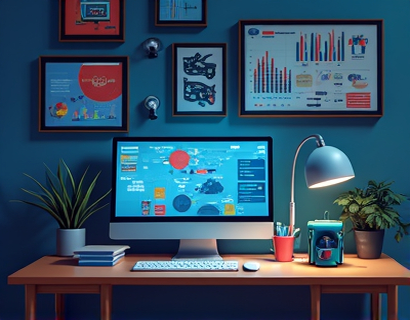AI-Powered Organizational Solutions: Transform Your Life with Intelligent Task Management Tools
In the fast-paced world we live in today, managing tasks efficiently and maintaining a structured daily routine can be challenging. The advent of artificial intelligence (AI) has brought forth a new era of organizational tools designed to simplify complex tasks, boost productivity, and streamline daily activities. These AI-powered solutions are not just about keeping track of to-do lists; they are transformative tools that can significantly enhance your personal and professional life. This guide delves into the world of intelligent task management tools, exploring how they can help you achieve greater efficiency and a more fulfilling life.
Understanding AI-Powered Organizational Tools
AI-powered organizational tools leverage machine learning algorithms and natural language processing to understand and manage tasks with unprecedented accuracy and efficiency. These tools can learn from user behavior, adapt to individual preferences, and provide personalized recommendations. Unlike traditional task management apps, AI-driven solutions can predict deadlines, suggest optimal task sequences, and even anticipate potential bottlenecks in your workflow.
The core functionality of these tools includes automated task creation, smart reminders, and intelligent prioritization. For instance, an AI tool can analyze your calendar, emails, and past task completion patterns to automatically create a daily to-do list. It can also prioritize tasks based on urgency and importance, ensuring that you focus on what truly matters. This level of automation not only saves time but also reduces the cognitive load, allowing you to concentrate on high-value activities.
Enhancing Productivity with AI
Productivity is often hindered by disorganization and inefficiency. AI-powered tools address these issues head-on by providing robust solutions that keep your tasks and projects well-organized. One of the key features is the ability to integrate with various platforms and services, such as email, calendar, and cloud storage. This seamless integration ensures that all your tasks and documents are in one place, accessible from anywhere.
Another significant advantage is the use of natural language processing (NLP). Users can input tasks verbally or through text, and the AI will accurately interpret and categorize them. For example, you can say, "Schedule a meeting with John for next Wednesday at 2 PM," and the tool will create a calendar event, send invitations, and add it to your task list. This hands-free approach not only speeds up the task creation process but also minimizes errors.
AI tools also offer advanced analytics and insights. By tracking your task completion rates, time spent on tasks, and productivity patterns, these tools can provide valuable feedback. You can identify areas for improvement, set realistic goals, and adjust your strategies accordingly. This data-driven approach to productivity management is a game-changer, helping you make informed decisions and optimize your workflow.
Streamlining Daily Routines
One of the most immediate benefits of AI-powered organizational tools is the streamlining of daily routines. Morning routines, in particular, can be transformed. Imagine starting your day with a personalized briefing that summarizes your tasks, upcoming meetings, and important reminders. This quick overview sets a clear direction for the day, reducing the time spent on decision-making and planning.
AI tools can also manage repetitive tasks, such as setting reminders, sending follow-up emails, and updating status reports. By automating these tasks, you free up valuable time to focus on more strategic and creative work. For instance, an AI assistant can monitor project progress and notify you when certain milestones are approaching, ensuring that you stay on track without constant manual checks.
Additionally, these tools can help you maintain a consistent routine by enforcing habits and routines. For example, if you aim to exercise every morning at 7 AM, the AI can send a reminder and even integrate with your fitness tracker to log your activity. This level of support is crucial for building and maintaining healthy habits, contributing to a more balanced and productive life.
Personalization and Adaptability
One of the most compelling features of AI-powered organizational tools is their ability to adapt to individual needs. Each user is unique, with different preferences, work styles, and priorities. AI tools learn from your interactions and adjust their behavior to better suit your requirements. This personalization ensures that the tools remain relevant and effective over time.
For instance, if you tend to procrastinate on certain types of tasks, the AI can implement strategies to keep you on track. It might break down large tasks into smaller, manageable steps or set intermediate deadlines to maintain momentum. This tailored approach not only enhances productivity but also boosts confidence and motivation.
Moreover, AI tools can integrate with other smart devices and services, creating a holistic ecosystem of productivity. For example, smart home devices can be synchronized to adjust lighting, temperature, and music based on your schedule, creating an optimal environment for work or relaxation. This level of integration makes your daily routines more efficient and enjoyable.
Overcoming Common Challenges
While AI-powered organizational tools offer numerous benefits, they are not without challenges. One common concern is the initial learning curve. Setting up and fully utilizing these tools requires some time and effort. However, most platforms offer intuitive interfaces and comprehensive guides to help users get started quickly. Additionally, many tools provide customer support to address any issues or questions.
Another challenge is data privacy and security. Storing sensitive information in the cloud can be daunting, but reputable AI tools implement robust security measures to protect user data. Look for tools that comply with industry standards and offer encryption, two-factor authentication, and transparent privacy policies.
Lastly, over-reliance on AI tools can sometimes lead to a decrease in manual skills. It's essential to strike a balance by using these tools as aids rather than complete replacements for your own organizational skills. Regularly review and adjust your tasks manually to maintain a deeper understanding of your workflow.
Case Studies and Real-World Applications
To better understand the impact of AI-powered organizational tools, let's explore some real-world applications. Consider a busy professional managing multiple projects and a growing family. With an AI assistant, this individual can effortlessly manage work deadlines, schedule family activities, and handle household tasks. The AI can prioritize tasks based on urgency, delegate responsibilities, and even suggest time-blocking techniques to maximize productivity.
In the academic realm, students can benefit greatly from AI-powered study planners. These tools can help manage course schedules, track assignments, and set study goals. By analyzing past performance and upcoming exams, the AI can recommend optimal study times and resources, reducing stress and improving academic outcomes.
For small business owners, AI organizational tools can streamline operations, manage inventory, and track customer interactions. Automated reminders for follow-up emails and appointments ensure that no detail is overlooked, allowing business owners to focus on growth and innovation.
Future Trends in AI Organizational Tools
The future of AI-powered organizational tools is exciting and rapidly evolving. One trend is the integration of augmented reality (AR) and virtual reality (VR) to create immersive planning experiences. Imagine visualizing your task list in a 3D space, where you can interact with tasks and projects in a more intuitive manner. This technology can revolutionize how we approach task management and project planning.
Another trend is the incorporation of emotional intelligence into AI tools. By understanding and responding to user emotions, these tools can provide more empathetic support and motivation. For example, if the AI detects signs of stress or burnout, it can suggest breaks, relaxation techniques, or even connect you with mental health resources.
Furthermore, the rise of decentralized and blockchain-based solutions promises enhanced data security and user control. These technologies can ensure that user data is stored securely and that users have full ownership of their information, addressing privacy concerns and building trust in AI tools.
Conclusion
AI-powered organizational tools represent a significant leap forward in personal productivity and efficiency. By automating routine tasks, providing intelligent insights, and adapting to individual needs, these tools can transform your daily life. Whether you're a busy professional, a student, or someone looking to improve your personal organization, AI tools offer tailored solutions to help you achieve your goals. Embracing these innovative technologies can lead to a more structured, fulfilling, and successful life.











































